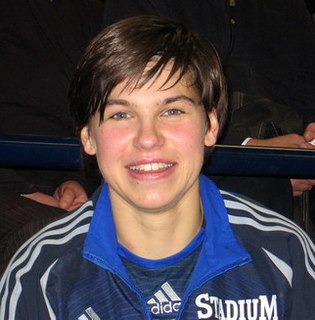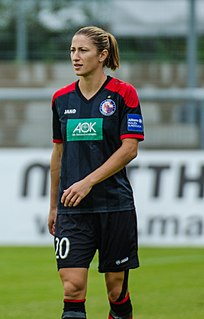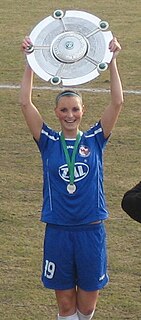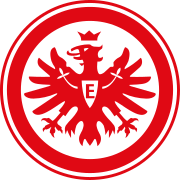
The Frauen-Bundesliga, currently known as the FLYERALARM Frauen-Bundesliga for sponsorship reasons, is the top level of league competition for women's association football in Germany. In 1990 the German Football Association (DFB) created the German Women's Bundesliga, based on the model of the men's Bundesliga. It was first played with north and south divisions, but in 1997 the groups were merged to form a uniform league. The league currently consists of twelve teams and the seasons usually last from late summer to the end of spring with a break in the winter.

1. Frauenfußballclub Turbine Potsdam 71 e. V., commonly known as 1. FFC Turbine Potsdam, is a German women's football club located in Potsdam, Brandenburg. They are one of the most successful women's football teams in Germany, having won six Frauen-Bundesliga championships and two UEFA Women's Champions League titles. They play in the Karl-Liebknecht-Stadion in the Babelsberg district of Potsdam, and their biggest rivals are 1. FFC Frankfurt.

Nadine Marejke Angerer is a German football coach and player who is currently a goalkeeping player-coach for Portland Thorns of the National Women's Soccer League (NWSL).

FC Bayern Munich is a German women's football squad based in Munich, Bavaria. It currently plays in the Frauen-Bundesliga, the top women's league in Germany.

Conny Pohlers is a retired German football player. Since 1998 she has played in the Women's Bundesliga and since 2001 in the Germany women's national football team.

Babett Peter is a German footballer. She plays as a defender for Real Madrid CF.

Ariane Hingst is a retired German footballer who is currently an analyst for Fox Sports. She was primarily utilized as a defender or a defensive holding midfielder. Hingst announced in the middle of 2011 that she would be retiring from international football with the German national team. In addition it was announced by 1. FFC Frankfurt manager Siegfried Dietrich that Hingst had left the Frankfurt club.

Melanie Behringer is a German footballer who played as a midfielder for Bayern Munich. She has been Best FIFA Women's Player finalist.

Fatmire "Lira" Alushi is a German former professional footballer who played as an attacking midfielder. She placed third in 2010 FIFA Ballon d'Or competition, an annual award given to the world's best player.

Jessica Wich is a German football striker. She currently plays for Bayer 04 Leverkusen.

Bianca Schmidt is a German footballer. She plays as a defender for Turbine Potsdam and the German national team.
FCR 2001 Duisburg was a German women's football club from Duisburg. The first team played in the Bundesliga. They originate from a women's team formed in 1977 under the umbrella of FC Rumeln-Kaldenhausen and have existed as an independent club since 8 June 2001. The colors of the 400-member-strong club are green and white. The first team of FCR 2001 Duisburg, who carry the nickname of "Die Löwinnen" (lionesses), have played in the Bundesliga since gaining promotion in 1993. Winning the UEFA Women's Cup in 2009 and with past success in the German championship (2000) and the cup (twice), FCR Duisburg was one of the top teams in German women's football. In 2013 the club filed for insolvency and players joined and formed a new women's section at MSV Duisburg.
The DFB-Pokal 2009–10 was the 30th season of the cup competition, Germany's second-most important title in women's football. The tournament started on 13 September 2009 and the final was held on 15 May 2010 in Cologne. FCR 2001 Duisburg defeated FF USV Jena 1–0, thus defending their title from the previous season and claiming their third. The final set a European record for the largest attendance of a national women's club game with 26,282 visitors in the RheinEnergieStadion, Cologne.
The Frauen DFB-Pokal 1998–99 was the 19th season of the cup competition, Germany's second-most important title in women's football. The first round of the competition was held on 16–17 August 1998. In the final which was held in Berlin on 12 June 1999 FFC Frankfurt defeated FCR Duisburg 1–0, thus winning their first cup. As they also won the Bundesliga in the same season, Frankfurt claimed the double, too.

Josephine Henning is a former German footballer who last played as a centre-back for Arsenal and the Germany national team. Since making her debut for the national team in September 2010, she has won over 25 caps and represented her country at UEFA Women's Euro 2013 and the 2015 FIFA Women's World Cup.
The DFB-Pokal 2010–11 was the 31st season of the cup competition, Germany's second-most important title in women's football. 1. FFC Frankfurt defeated 1. FFC Turbine Potsdam 2–1 in the final in Cologne on 26 March 2011.

Laura Feiersinger is an Austrian footballer who plays as a midfielder for German Frauen-Bundesliga club Eintracht Frankfurt and the Austria women's national team.

Corina Schröder is a German footballer who plays as a left-back most recently for Birmingham City in the FA WSL, having previously played for Liverpool Ladies. Before moving to England she played for FCR 2001 Duisburg, 1. FFC Turbine Potsdam and SC 07 Bad Neuenahr in her native Germany. Nicknamed "Coco", she has also been capped for the Germany women's national under-20 football team.

Merle Frohms is a German footballer. She is currently playing for Eintracht Frankfurt and the Germany national team.
The 2020–21 DFB-Pokal is the 41st season of the annual German football cup competition. Several teams participate in the competition, including all teams from the previous year's Frauen-Bundesliga and the 2. Frauen-Bundesliga, excluding second teams. The competition will begin on 26 September 2020 with the first of six rounds and will end on 20 May 2021 with the final at the RheinEnergieStadion in Cologne, a nominally neutral venue, which has hosted the final since 2010. The DFB-Pokal is considered the second-most important club title in German women's football after the Bundesliga championship. The DFB-Pokal is run by the German Football Association (DFB).



















